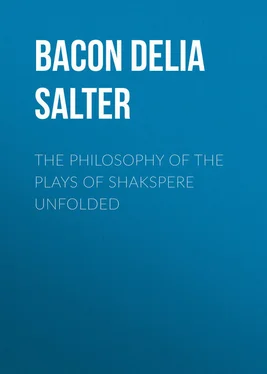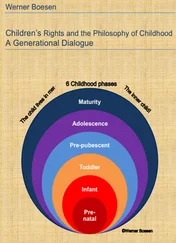Delia Bacon - The Philosophy of the Plays of Shakspere Unfolded
Здесь есть возможность читать онлайн «Delia Bacon - The Philosophy of the Plays of Shakspere Unfolded» — ознакомительный отрывок электронной книги совершенно бесплатно, а после прочтения отрывка купить полную версию. В некоторых случаях можно слушать аудио, скачать через торрент в формате fb2 и присутствует краткое содержание. Жанр: literature_19, foreign_antique, foreign_prose, на английском языке. Описание произведения, (предисловие) а так же отзывы посетителей доступны на портале библиотеки ЛибКат.
- Название:The Philosophy of the Plays of Shakspere Unfolded
- Автор:
- Жанр:
- Год:неизвестен
- ISBN:нет данных
- Рейтинг книги:3 / 5. Голосов: 1
-
Избранное:Добавить в избранное
- Отзывы:
-
Ваша оценка:
- 60
- 1
- 2
- 3
- 4
- 5
The Philosophy of the Plays of Shakspere Unfolded: краткое содержание, описание и аннотация
Предлагаем к чтению аннотацию, описание, краткое содержание или предисловие (зависит от того, что написал сам автор книги «The Philosophy of the Plays of Shakspere Unfolded»). Если вы не нашли необходимую информацию о книге — напишите в комментариях, мы постараемся отыскать её.
The Philosophy of the Plays of Shakspere Unfolded — читать онлайн ознакомительный отрывок
Ниже представлен текст книги, разбитый по страницам. Система сохранения места последней прочитанной страницы, позволяет с удобством читать онлайн бесплатно книгу «The Philosophy of the Plays of Shakspere Unfolded», без необходимости каждый раз заново искать на чём Вы остановились. Поставьте закладку, и сможете в любой момент перейти на страницу, на которой закончили чтение.
Интервал:
Закладка:
But if any doubt in regard to the use of the method described, in the composition of the work now first produced as AN EXAMPLE of the use of it, should still remain in any mind; or if this method of unravelling it should seem too studious, perhaps the author's own word for it in one more quotation may be thought worth taking.
' I can give no account of my life by MY ACTIONS, fortune has placed them too low; I must do it BY MY FANCIES. And when shall I have done representing the continual agitation and change of my thoughts as they come into my head, seeing that Diomedes filled six thousand books upon the subject of grammar.' [The commentators undertake to set him right here, but the philosopher only glances in his intention at the voluminousness of the science of words , in opposition to the science of things , which he came to establish.] 'What must prating produce , since prating itself, and the first beginning to speak, stuffed the world with such a horrible load of volumes. So many words about words only. They accused one Galba, of old, of living idly; he made answer that every one ought to give account of his actions , but not of his leisure . He was mistaken, for justice – [the civil authority] – has cognizance and jurisdiction over those that do nothing , or only PLAY at WORKING… Scribbling appears to be the sign of a disordered age. Every man applies himself negligently to the duty of his vocation at such a time and debauches in it.' From that central wrong of an evil government, an infectious depravity spreads and corrupts all particulars. Everything turns from its true and natural course. Thus scribbling is the sign of a disordered age. Men write in such times instead of acting; and scribble, or seem to perhaps, instead of writing openly to purpose.
And yet, again, that central, and so divergent, wrong is the result of each man's particular contribution, as he goes on to assert. 'The corruption of this age is made up by the particular contributions of every individual man,' —
He were no lion, were not Romans hinds. — Cassius .
'Some contribute treachery , others injustice , irreligion, tyranny , avarice and cruelty, according as they have power; the WEAKER SORT CONTRIBUTE FOLLY, VANITY, and IDLENESS, and of these I am one.'
Caesar loves no plays as thou dost, Antony. Such men are dangerous.
Or, as the same poet expresses it in another Roman play: —
This double worship ,
Where one part does disdain with cause, the other
Insult without all reason ; where gentry, title, wisdom
Cannot conclude but by the yea and no
Of general ignorance , – it must omit
Real necessities – and give way the while
To unstable slightness; purpose so barred ,
It follows, nothing is done to purpose.
And that is made the plea for an attempt to overthrow the popular power, and to replace it with a government containing the true head of the state, its nobility, its learning, its gentleness, its wisdom.
But the essayist continues: – 'It seems as if it were the season for vain things when the hurtful oppress us ; in a time when doing ill is common, to do nothing but what signifies nothing is a kind of commendation. 'Tis my comfort that I shall be one of the last that shall be called in question, – for it would be against reason to punish the less troublesome while we are infested with the greater . As the physician said to one who presented him his finger to dress, and who, as he perceived, had an ulcer in his lungs , "Friend, it is not now time to concern yourself about your finger's ends." And yet I saw some years ago, a person, whose name and memory I have in very great esteem , in the very height of our great disorders, when there was neither law nor justice put in execution, nor magistrate that performed his office , — no more than there is now , – publish I know not what pitiful reformations about clothes, cookery and law chicanery . These are amusements wherewith to feed a people that are ill used, to show that they are not totally forgotten. These others do the same, who insist upon stoutly defending the forms of speaking , dances and games to a people totally abandoned to all sorts of execrable vices – it is for the Spartans only to fall to combing and curling themselves, when they are just upon the point of running headlong into some extreme danger of their lives.
'For my part , I have yet a worse custom. I scorn to mend myself by halves. If my shoe go awry, I let my shirt and my cloak do so too: when I am out of order I feed on mischief. I abandon myself through despair, and let myself go towards the precipice, and as the saying is, throw the helve after the hatchet.' We should not need, perhaps, the aid of the explanations already quoted, to show us that the author does not confess this custom of his for the sake of commending it to the sense or judgment of the reader, – who sees it here for the first time it may be put into words or put on paper, who looks at it here, perhaps, for the first time objectively, from the critical stand-point which the review of another's confession creates; and though it may have been latent in the dim consciousness of his own experience, or practically developed, finds it now for the first time, collected from the phenomena of the blind, instinctive, human motivity, and put down on the page of science, as a principle in nature, in human nature also.
But this is indeed a Spartan combing and curling, that the author is falling to, in the introductory flourishes ('diversions' as he calls them) of this great adventure, that his pen is out for now: he is indeed upon the point of running headlong into the fiercest dangers; – it is the state, the wretched, discased, vicious state, dying apparently, yet full of teeth and mischief, that he is about to handle in his argument with these fine, lightsome, frolicsome preparations of his, without any perceptible 'mittens'; it is the heart of that political evil that his time groans with, and begins to find insufferable, that he is going to probe to the quick with that so delicate weapon. It is a tilt against the block and the rack, and all the instruments of torture, that he is going to manage, as handsomely, and with as many sacrifices to the graces, as the circumstances will admit of. But the political situation which he describes so boldly (and we have already seen what it is) affects us here in its relation to the question of style only, and as the author himself connects it with the point of our inquiry.
'A man may regret,' he says, 'the better times, but cannot fly from the present, we may wish for other magistrates, but we must, notwithstanding, obey those we have; and, peradventure, it is more laudable to obey the bad than the good, so long as the image of the ancient and received laws of this monarchy shall shine in any corner of the kingdom. If they happen, unfortunately, to thwart and contradict one another, so as to produce two factions of doubtful choice,' —
And my soul aches
To know, [says Coriolanus] when two authorities are up,
Neither supreme, how soon confusion
May enter 'twixt the gap of both, and take
The one by the other.
– 'in this contingency will willingly choose,' continues the other, 'to withdraw from the tempest, and in the meantime, nature or the hazards of war may lend me a helping hand . Betwixt Cæsar and Pompey, I should soon and frankly have declared myself, but amongst the three robbers that came after, a man must needs have either hid himself , or have gone along with the current of the time, which I think a man may lawfully do, when reason no longer rules .' ' Whither dost thou wandering go?'
Читать дальшеИнтервал:
Закладка:
Похожие книги на «The Philosophy of the Plays of Shakspere Unfolded»
Представляем Вашему вниманию похожие книги на «The Philosophy of the Plays of Shakspere Unfolded» списком для выбора. Мы отобрали схожую по названию и смыслу литературу в надежде предоставить читателям больше вариантов отыскать новые, интересные, ещё непрочитанные произведения.
Обсуждение, отзывы о книге «The Philosophy of the Plays of Shakspere Unfolded» и просто собственные мнения читателей. Оставьте ваши комментарии, напишите, что Вы думаете о произведении, его смысле или главных героях. Укажите что конкретно понравилось, а что нет, и почему Вы так считаете.












